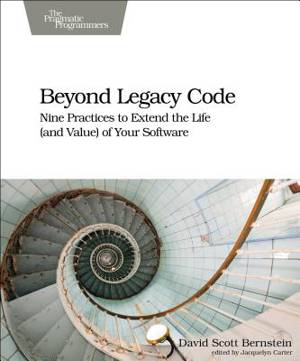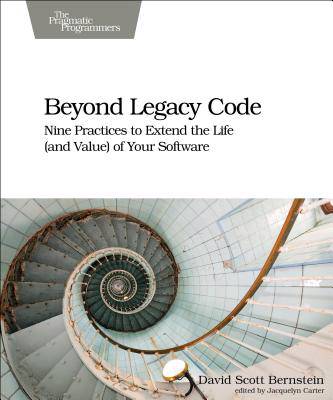
Bedankt voor het vertrouwen het afgelopen jaar! Om jou te bedanken bieden we GRATIS verzending (in België) aan op alles gedurende de hele maand januari.
- Afhalen na 1 uur in een winkel met voorraad
- In januari gratis thuislevering in België
- Ruim aanbod met 7 miljoen producten
Bedankt voor het vertrouwen het afgelopen jaar! Om jou te bedanken bieden we GRATIS verzending (in België) aan op alles gedurende de hele maand januari.
- Afhalen na 1 uur in een winkel met voorraad
- In januari gratis thuislevering in België
- Ruim aanbod met 7 miljoen producten
Zoeken
Beyond Legacy Code
Nine Practices to Extend the Life (and Value) of Your Software
David Bernstein
Paperback | Engels
€ 54,95
+ 109 punten
Omschrijving
We're losing tens of billions of dollars a year on broken software, and great new ideas such as agile development and Scrum don't always pay off. But there's hope. The nine software development practices in Beyond Legacy Code are designed to solve the problems facing our industry. Discover why these practices work, not just how they work, and dramatically increase the quality and maintainability of any software project.
These nine practices could save the software industry. Beyond Legacy Code is filled with practical, hands-on advice and a common-sense exploration of why technical practices such as refactoring and test-first development are critical to building maintainable software. Discover how to avoid the pitfalls teams encounter when adopting these practices, and how to dramatically reduce the risk associated with building software--realizing significant savings in both the short and long term. With a deeper understanding of the principles behind the practices, you'll build software that's easier and less costly to maintain and extend.
By adopting these nine key technical practices, you'll learn to say what, why, and for whom before how; build in small batches; integrate continuously; collaborate; create CLEAN code; write the test first; specify behaviors with tests; implement the design last; and refactor legacy code.
Software developers will find hands-on, pragmatic advice for writing higher quality, more maintainable, and bug-free code. Managers, customers, and product owners will gain deeper insight into vital processes. By moving beyond the old-fashioned procedural thinking of the Industrial Revolution, and working together to embrace standards and practices that will advance software development, we can turn the legacy code crisis into a true Information Revolution.
These nine practices could save the software industry. Beyond Legacy Code is filled with practical, hands-on advice and a common-sense exploration of why technical practices such as refactoring and test-first development are critical to building maintainable software. Discover how to avoid the pitfalls teams encounter when adopting these practices, and how to dramatically reduce the risk associated with building software--realizing significant savings in both the short and long term. With a deeper understanding of the principles behind the practices, you'll build software that's easier and less costly to maintain and extend.
By adopting these nine key technical practices, you'll learn to say what, why, and for whom before how; build in small batches; integrate continuously; collaborate; create CLEAN code; write the test first; specify behaviors with tests; implement the design last; and refactor legacy code.
Software developers will find hands-on, pragmatic advice for writing higher quality, more maintainable, and bug-free code. Managers, customers, and product owners will gain deeper insight into vital processes. By moving beyond the old-fashioned procedural thinking of the Industrial Revolution, and working together to embrace standards and practices that will advance software development, we can turn the legacy code crisis into a true Information Revolution.
Specificaties
Betrokkenen
- Auteur(s):
- Uitgeverij:
Inhoud
- Aantal bladzijden:
- 276
- Taal:
- Engels
Eigenschappen
- Productcode (EAN):
- 9781680500790
- Verschijningsdatum:
- 1/09/2015
- Uitvoering:
- Paperback
- Formaat:
- Trade paperback (VS)
- Afmetingen:
- 190 mm x 235 mm
- Gewicht:
- 480 g

Alleen bij Standaard Boekhandel
+ 109 punten op je klantenkaart van Standaard Boekhandel
Beoordelingen
We publiceren alleen reviews die voldoen aan de voorwaarden voor reviews. Bekijk onze voorwaarden voor reviews.









